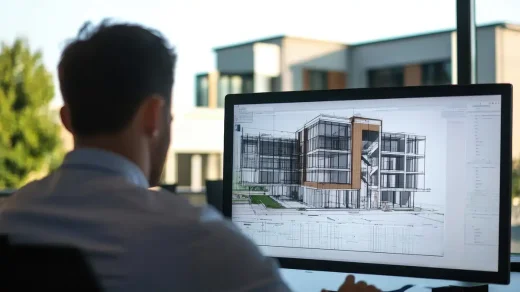What makes a great commercial architect: key skills and traits , roof repair contractor, Building home maintenance
What Makes a Great Commercial Architect: Key Skills and Traits
15 December 2024
Behind every stunning commercial building lies the vision and expertise of a talented architect. But what makes a great commercial architect? Is it just about designing aesthetically pleasing structures?
This blog post will uncover the essential skills and traits that set top commercial architects apart. Discover the qualities that drive innovation and success in commercial architecture, from technical prowess to strategic thinking.
- Strong Technical Knowledge
A great commercial architect deeply understands architectural principles, engineering concepts, and building systems. They must be well-versed in structural integrity, materials science, and construction methods to ensure their designs are both safe and durable. Mastery of relevant software tools such as AutoCAD, Revit, and Building Information Modeling (BIM) platforms is critical for translating conceptual ideas into detailed and precise plans. Beyond design tools, they must stay updated on evolving building codes, zoning laws, and safety regulations to guarantee compliance in all aspects of their work.
- Innovative and Creative Thinking
Commercial architects are problem solvers and visionaries, constantly tasked with designing spaces that balance functionality and artistic appeal. Creativity enables them to envision unique solutions for complex challenges, such as making the most of limited space, adhering to strict budget constraints, or meeting diverse client needs. An architect’s ability to think innovatively transforms mundane spaces into landmarks, fostering environments that inspire and serve their occupants. Creativity also ensures their innovative design stand out in competitive markets, offering fresh and modern perspectives.
- Attention to Detail
Even the smallest oversight can lead to significant consequences in commercial architecture, including safety hazards, cost overruns, or client dissatisfaction. Exceptional architects pay close attention to every project element, from the macro-level structural components to the micro-level finishes and fixtures. They carefully review all drawings, calculations, and specifications to ensure accuracy. This meticulous approach guarantees the final build’s quality and prevents costly mistakes during construction.
- Effective Communication Skills
Great architects understand that communication is the foundation of successful collaboration. They must articulate their ideas clearly through detailed drawings, 3D renderings, or verbal presentations. Effective communication is equally important when interpreting a client’s vision, addressing feedback, or coordinating with contractors and engineers. Active listening skills are essential to ensure they fully grasp client requirements and resolve potential conflicts within a team. A commercial architect who communicates effectively fosters trust and alignment among all stakeholders.
- Project Management Expertise
Commercial architecture projects are often large in scale, involving multiple teams, extensive timelines, and significant budgets. A great architect excels at managing these complexities by staying organized and proactive. They are skilled at scheduling tasks, setting realistic deadlines, and ensuring each construction project phase progresses smoothly. When challenges arise—such as delays in material delivery or unforeseen site issues—they can adapt quickly, keeping the project on track. Strong leadership abilities allow them to motivate teams and maintain focus on shared goals, ensuring successful project delivery.
- Knowledge of Sustainability and Green Building Practices
Sustainability is no longer optional in modern architecture—it’s a necessity. Outstanding commercial architects prioritize eco-friendly designs that minimize environmental impact. This requires an in-depth understanding of green building practices, such as using renewable materials, energy-efficient systems, and water conservation strategies. They also consider maximizing natural lighting, ventilation, and energy savings within their designs. By integrating sustainability, architects help preserve the environment and create commercial buildings with long-term cost benefits and a positive reputation.
- Problem-Solving Abilities
Unexpected challenges are common in commercial architecture, whether due to site constraints, shifting client requirements, or regulatory hurdles. Exceptional architects remain calm and resourceful under pressure, leveraging their expertise to develop practical solutions. They approach problems methodically, analyzing all aspects before implementing a plan. Their problem-solving skills extend beyond technical issues; they also navigate interpersonal challenges, ensuring that team dynamics remain productive and clients feel heard and supported.
- Client-Centric Approach
An architect’s ability to prioritize the client’s vision and goals is critical to their success. Great architects actively involve clients throughout the design process, ensuring their needs and expectations are met. They are adaptable, willing to revise plans to incorporate feedback, and committed to creating commercial spaces that align with the client’s brand, functionality, and vision. They build long-lasting relationships that lead to repeat business and strong referrals by fostering open communication and trust.
- A Keen Sense of Trends and Market Demands
The commercial architecture landscape is constantly evolving, shaped by changing consumer preferences, technological advancements, and societal needs. Architects who stay informed about trends like flexible workspaces, smart building technologies, or mixed-use developments gain a competitive edge. Understanding market demands allows them to design spaces that are not only relevant but also future-proof, ensuring their projects remain valuable assets in the years to come.
- Team Collaboration Skills
Commercial projects require the combined efforts of multidisciplinary teams, including engineers, contractors, designers, and consultants. A great commercial architect fosters a collaborative environment where each team member’s expertise is valued. They act as a bridge, ensuring seamless stakeholder communication and resolving conflicts effectively. Promoting teamwork and mutual respect drives the collective effort toward achieving a unified vision.
Conclusion
A successful commercial architect possesses a unique blend of technical expertise, creative vision, and strong interpersonal skills. By mastering these essential qualities, architects can design innovative and functional spaces that inspire and delight. As the world of architecture continues to evolve, the role of the commercial architect will remain crucial in shaping the built environment.
Comments on this guide to What Makes a Great Commercial Architect: Key Skills and Traits article are welcome.
Roofing Articles
Roofing Posts
Flat roof repair

image source : pixabay.com
Insulation Options for Your Roof

image source : pexels.com
How to make your roofing company a success
Eco Architecture
Contemporary Green Architecture Design
Comments / photos for the What Makes a Great Commercial Architect: Key Skills and Traits page welcome







